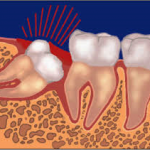When  it comes to chewing gum, it’s the type of gum you chew that makes a difference in whether it’s helpful or harmful to your teeth. While chewing gum containing sugar may actually increase your chances of developing a cavity, there is evidence that demonstrates just the opposite for sugar-free gum. And there’s even better news when it comes to chewing sugar-free gum that is sweetened with xylitol.
it comes to chewing gum, it’s the type of gum you chew that makes a difference in whether it’s helpful or harmful to your teeth. While chewing gum containing sugar may actually increase your chances of developing a cavity, there is evidence that demonstrates just the opposite for sugar-free gum. And there’s even better news when it comes to chewing sugar-free gum that is sweetened with xylitol.
Sugar-free gum helps to clean teeth:
Studies have shown that chewing sugar-free gum after meals and snacks can help rinse off the acids released by the bacteria in plaque, which are harmful to tooth enamel. Both the act of chewing and the flavor of the artificial sweeteners in the gum stimulate ten times the normal rate of saliva flow. Not only does the increased saliva flow neutralize the acids in your mouth, it also washes away food particles, helping to keep your teeth clean.
Xylitol reduces decay-causing bacteria:
Sugar-free gum sweetened with xylitol has the added benefit of inhibiting the growth of oral bacteria that cause cavities. In the presence of xylitol, the bacteria lose the ability to adhere to the tooth, stunting the cavity-causing process. With xylitol use over a
period of time, the types of bacteria in the mouth change and fewer decay-causing bacteria survive on tooth surfaces.
To chew or not to chew:
Although chewing sugar-free gum can be beneficial in most instances, there are some cases in which chewing gum is not recommended. For example, if you are experiencing any type of jaw pain you should refrain from chewing gum and talk to Dr. Tillman about what options are available to you.
For most people, chewing sugar-free gum (especially gum sweetened with xylitol) can be a good preventive measure in
situations when toothbrushing and flossing aren’t practical, but sugar-free or not, chewing gum should never replace good dental hygiene practices.
With all these options waiting at the checkout candy rack, it is easier than ever to satisfy your sweet tooth and protect it from cavities at the same time. The next time you are in the mood for a sweet treat, why not bite into a piece of sugar free or cavity-fighting gum that is good for your teeth instead of a sugar-filled candy? Your teeth will thank you.

 Is Bottled Water Bad for My Teeth??
Is Bottled Water Bad for My Teeth?? Warning Signs of Impacted Wisdom Teeth
Warning Signs of Impacted Wisdom Teeth